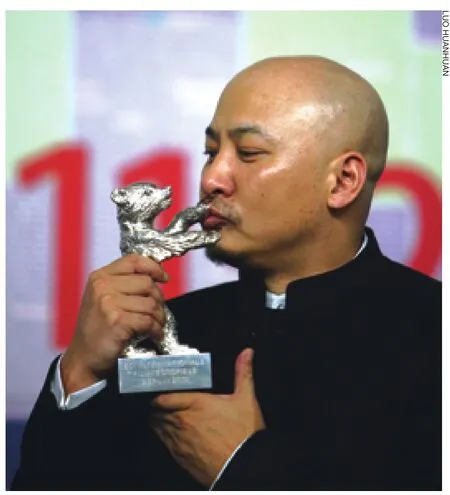Silver Bear for Screenplay
2010-03-15ChinesedirectorpicksupsecondBerlinaleAward
Chinese director picks up second Berlinale Award
Chinese director picks up second Berlinale Award
By LIU YUNYUN
Chinese director Wang Quan’an won the Silver Bear Prize at the 60th Berlin International Film Festival that lasted during February 11 to 21 for the best screenplay for his movie Apart Together. The film also opened the festival.
The low-budget film, based on a true story, tells how the retired soldier Liu Yuansheng reunites with his lost wife Qiao Yu’e after he fled his hometown Shanghai to Taiwan after his side was defeated in the War of Liberation (1945-49). Decades later,he returns to the mainland to join Qiao, only to fi nd she has married again to Lu Shanmin and has three children. Liu is caught in the dilemma of having to break up another couple if he reunites with his lost wife.
“Families should be reunited, but it isn’t always easy. We think that being apart is hard, but being together sometimes is even harder,” Director Wang said.
Movie critics said that Apart Together resonated easily with Berlin residents as Germans underwent separation for years before the country was united again 21 years ago. The year 2009 marked the 20th anniversary of the fall of the Berlin Wall, and also the 60th year Taiwan and the mainland were separated by the war.
Wang said he expected the movie would be shown in domestic cinemas from the middle of this year, when the 2010 Shanghai Expo will be held.
It is the second time Wang has won a prize at the Berlinale. His film Tuya’s Wedding, which tells a tale of a family ripped apart by poverty and misfortune, made him the winner of the 2007 Golden Bear. He is also the third director from China to win both Golden Bear and Silver Bear awards, after Zhang Yimou and Xie Fei.
Yu Nan, leading actress of Tuya’s Wedding, was one of the judges at the 60th Berlinale, who also presented the Silver Bear to Wang.
“Chinese people attach great importance to family reunions. But sometimes it is hard to bridge the gap caused by time,” Wang told Xinhua News Agency. “But still, we pursue fervently the concept of family reunion. I think that is the whole significance of the fi lm.”
When talking about becoming a successful script writer, Wang said he just wants to observe life because “life is richer than the story we want to tell in a movie.”
In China’s film industry, Wang is known for his pursuit of cultural values,cultural heritage and art. But his name is relatively unknown to ordinary moviegoers. Even his Golden Bear-winning Tuya’s Wedding was not well received by domestic audiences and its box office takings were estimated to be less than 5 million yuan ($732,000).

KISSING THE BEAR: Chinese director Wang Quan’an kisses the Silver Bear at a press conference held after he won best screenplay at the 60th Berlinale
“Film is both a commercial and cultural product. While paying high attention to box of fi ce, we need to maintain the artistic quality of a movie itself,” Wang said. He said Berlinale was more a serious festival and the audiences were willing to think about the bigger issues.
Wang plans to invite international moviemakers for his next fi lm which will also be set in Shanghai.
About 400 movies were invited to take part in this year’s Berlinale, and 10 Chineselanguage fi lms were shown. Besides Wang’s Apart Together, other Chinese movies included Zhang Yimou’s A Woman, A Gun and A Noodle Shop.
In 1988, Zhang won the first Golden Bear for Chinese moviemakers with his directorial debut Red Sorghum, which had a further showing in this year festival’s retrospective series Play It Again.
Although Zhang’s comedy did not win any awards at this year’s festival, he is still the life and soul of the Chinese fi lm industry,said Yu. Since he won his first Berlinale award, Zhang has successfully turned from being an art fi lm director into a commercial movie director.Winning a Golden Bear award paved the way for him.
A number of Chinese actresses including Gong Li, Josephine Siao, Maggie Cheung and Yu Nan became superstars because of the awards they won at the Berlin festival.
Apart from the abovementioned two films that entered into the main competition section of this year’s Berlinale, other Chinese fi lms, such as Jackie Chan’s new movie The Big Soldier,and Woo-ping Yuen’s True Legend, were presented in the non-competition sections.
Chinese director Alex Law’s Echoes of the Rainbow won the Crystal Bear for Best Film in the 14 plus section of the Generation Competition.
Since 1982 when Chinese animated cartoon Three Monks took a Silver Bear for short film at the 32nd Berlinale,more than 40 Chinese films have won various accolades. ■
